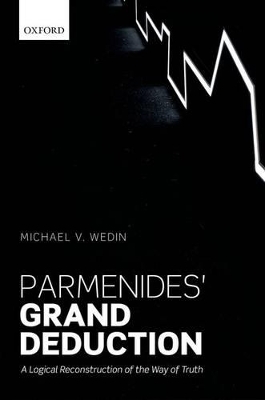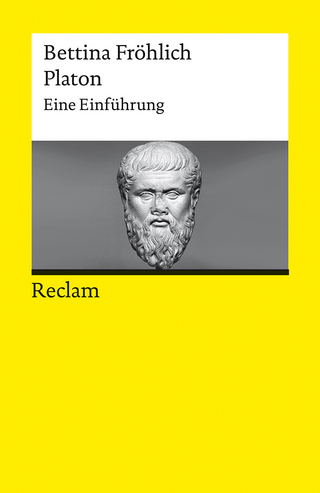
Parmenides' Grand Deduction
A Logical Reconstruction of the Way of Truth
Seiten
2014
Oxford University Press (Verlag)
978-0-19-871547-4 (ISBN)
Oxford University Press (Verlag)
978-0-19-871547-4 (ISBN)
Michael V. Wedin presents a rigorous reconstruction of the deductions in Parmenides' Way of Truth: the most important philosophical treatise before Plato and Aristotle. He answers criticisms which claim that Parmenides' arguments are shot through with logical fallacies, and argues against natural explanations of Parmenides in the Ionian tradition
Michael V. Wedin presents a new interpretation of Parmenides' Way of Truth: the most important philosophical treatise before the work of Plato and Aristotle. The Way of Truth contains the first extended philosophical argument in the western tradition--an argument which decrees that there can be no motion, change, growth, coming to be, or destruction; and indeed that there can be only one thing. These severe metaphysical theses are established by a series of deductions and these deductions in turn rest on an even more fundamental claim, namely, the claim that it is impossible that there be something that is not. This claim is itself established by a deduction that Wedin calls the Governing Deduction. Wedin offers a rigorous reconstruction of the Governing Deduction and shows how it is used in the arguments that establish Parmenides' severe metaphysical theses (what Wedin calls the Corollaries of the Governing Deduction). He also provides successful answers to most commentators who find Parmenides' arguments to be shot through with logical fallacies. Finally, Wedin turns to what is currently the fashionable reading of Parmenides, according to which he falls squarely in the tradition of the Ionian natural philosophers. He argues that the arguments for the Ionian Interpretation fail badly. Thus, we must simply determine where Parmenides' argument runs, and here there is no substitute for rigorous logical reconstruction. On this count, as our reconstructions make clear, the argument of the Way of Truth leads to a Parmenides who is indeed a severe arbiter of philosophical discourse and who brings to a precipitous halt the entire enterprise of natural explanation in the Ionian tradition.
Michael V. Wedin presents a new interpretation of Parmenides' Way of Truth: the most important philosophical treatise before the work of Plato and Aristotle. The Way of Truth contains the first extended philosophical argument in the western tradition--an argument which decrees that there can be no motion, change, growth, coming to be, or destruction; and indeed that there can be only one thing. These severe metaphysical theses are established by a series of deductions and these deductions in turn rest on an even more fundamental claim, namely, the claim that it is impossible that there be something that is not. This claim is itself established by a deduction that Wedin calls the Governing Deduction. Wedin offers a rigorous reconstruction of the Governing Deduction and shows how it is used in the arguments that establish Parmenides' severe metaphysical theses (what Wedin calls the Corollaries of the Governing Deduction). He also provides successful answers to most commentators who find Parmenides' arguments to be shot through with logical fallacies. Finally, Wedin turns to what is currently the fashionable reading of Parmenides, according to which he falls squarely in the tradition of the Ionian natural philosophers. He argues that the arguments for the Ionian Interpretation fail badly. Thus, we must simply determine where Parmenides' argument runs, and here there is no substitute for rigorous logical reconstruction. On this count, as our reconstructions make clear, the argument of the Way of Truth leads to a Parmenides who is indeed a severe arbiter of philosophical discourse and who brings to a precipitous halt the entire enterprise of natural explanation in the Ionian tradition.
Michael V. Wedin is Professor of Philosophy at the University of California, Davis. He is the author of Mind and Imagination in Aristotle (Yale University Press, 1989), and Aristotle's Theory of Substance: The Categories and Metaphysics Zeta (OUP, 2000).
PART I: THE GOVERNING DEDUCTION AND PARMENIDES' MASTER ARGUMENT; PART II: THE DEDUCTIVE CONSEQUENCES OF THE GOVERNING DEDUCTION; PART III: CRITICAL REFLECTIONS
| Erscheint lt. Verlag | 16.10.2014 |
|---|---|
| Verlagsort | Oxford |
| Sprache | englisch |
| Maße | 163 x 240 mm |
| Gewicht | 580 g |
| Themenwelt | Geisteswissenschaften ► Philosophie ► Philosophie Altertum / Antike |
| ISBN-10 | 0-19-871547-1 / 0198715471 |
| ISBN-13 | 978-0-19-871547-4 / 9780198715474 |
| Zustand | Neuware |
| Haben Sie eine Frage zum Produkt? |


